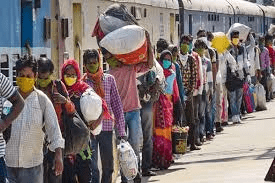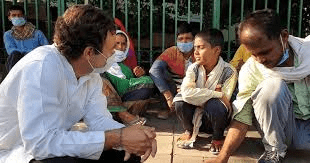On 9th June 2020, the Supreme Court directed the central and the state governments to send migrant workers home. The court also directed that no travel fare should be charged from them and free food must also be provided at all times.
Unravelling the migrant problems in light of the outbreak of COVID-19
With the pandemic being the elephant in the room there have been many problems faced by the country. One of the major problems is that of the migrant labourers. India went into a nationwide lockdown on 25th March 2020. This was in an attempt to control the spread of coronavirus disease. The untoward consequence of the lockdown hit the migrant labourers hard. They seemed to have lost their jobs and income overnight and were stranded in cities far from their homes. Hence, The Supreme Court asked the state governments to identify, register and avail transportation for the migrant labourers who intend to reach their homes in 15 days. The apex court also ruled that the central government should make Shramik trains available within 24 hours. This should be effective once the state governments request for the same.
Supreme Court issues directives to the Indian railways
The apex court ordered the railways to make 171 special Shramik trains. This would help migrant labourers reach home. The primary task for the states and union territories was the transportation of labourers. Followed by this, there was a need to provide them with food, ration and making job opportunities available for them.
The onus of providing these facilities vest with the states and union territories. The court further stated the train journey ought to be free of cost as the workers were forced to return to their native place as a result of the pandemic. The court also passed orders to the Director-General of police to handle the situation with the utmost sensitivity. And there be no police brutality reported. The death of labourers in the trains was a matter of concern for the court. This was attributed to the negligence of the railway authorities. Solicitor General Tushar Mehta appeared for the government in this case. Mehta disapproved negligence on the part of railways. He proved that the deaths resulted due to heart attack or pre-existing ailment. Not because of hunger or lack of adequate facilities.
The Supreme Court Orders to Withdraw cases against them for lockdown violations
The migrant workers, in an attempt to reach home, started walking to their native places. This act amounted to violation of the lockdown norms which were in force. As a consequence, there were complaints lodged against the migrant labourers. These complaints fell under the ambit of Section 51 of the Disaster Management Act. They were found guilty of obstructing the existing law in force. Punishment under Section 51 stated 1-year imprisonment or fine or both for the migrant labourers.
A bench headed by Justice Ashok Bhushan presided over this matter. It ordered the state governments and union territories to withdraw all the complaints. The bench also stated that the migrant workers set foot towards their native towns to escape hunger, poverty and contracting the disease. The bench brought the attention of the states towards the sensitivity of the issue. It reinstated the fact that the labourers had to violate the lockdown there being no other alternative. They are already suffering. Filing cases against them for violating the lockdown would be unethical. It would also prove to be an extra burden on the part of the poor labourers.
What after the migrant workers reach home?
Once the migrant workers reach home, there is still a duty cast on the government. The court reminded the state governments the future course of action which included:
Setting up of counselling Centres
The bench ordered for the setting up of counselling centers. Its motto should be to reach out to people. It should explain different schemes made by the government for rehabilitation.
Free access to information
A duty was cast on the center to provide free information to the migrants. Also, extend a helping hand to make sure the labourers have access to basic amenities.
To conduct skill-mapping
The court stated the dire need to conduct extensive skill mapping. Labourers returned to villages and blocks ought to be benefitted by skill-mapping. This would help the workers get a job.
To set up different schemes
This has to be set up to help the labourers go back to their previous jobs. The court pressed on the need to roll out different schemes to benefit labourers at large.
Contribution of the NGOs applauded
A lot of NGOs and individuals offered a helping hand in times of the pandemic. Food, transportation and shelter were provided to the migrant workers. This came in as a huge contribution. The government appreciated the same.
Is the Migrant crisis a class war in India?

The nation’s attention was drawn to the plight of the labourers once they hit the streets. The lockdown issued by the Modi government paid no attention to migrant labourers. It seemed to offer no help to the migrant labourers. There was no word by the government on their condition until they started walking back home. Even at this, there wasn’t much attention paid to the migrant workers. Some of them were packed into buses. Some put into relief camps. The situation seemed to be managed by dispersing them away from the cameras. Even when Nirmala Sitaraman announced a scheme to resolve this; it had nothing to do with migrant workers. The important question arises here is why was this not paid enough attention?

This issue projects the irony of the current Indian scenario. It raises important questions about the toxic media, loss of society’s morality, class disparity and the paralysis of Indian politics. Future historians would interpret this condition. While doing so, they would write about political lethargy, moral perversity and spin-doctoring. The central government was busy passing the buck on the state government. These instances gave way to certain developments in terms of the virus which would have been controlled otherwise.
Where does India stand compared to other countries in handling the pandemic?
To understand the state of COVID-19, one will have to look at the number of active cases. Active cases showcase the caseload that exists on the system. More active cases indicate more people taking treatment and many being vulnerable to the disease. At present India stands at number 5 in the list of countries affected by the virus. India stands below UK, US, Brazil and Russia in terms of the number of active cases.
Another important aspect to be noted here is the doubling rate. Doubling rate indicates the number of days required for the active cases to become double. Here, India is most vulnerable compared to any other country on the top of the table. India’s doubling rate (14 days) is much -higher than any other country above it. United States, UK, Russia and Spain have much lower doubling rates when compared to India. This scenario calls for immediate attention. To get this situation under control, there is a need for extensive testing, strict restrictions on the congregation of people and making available the required testing apparatus. The government needs to pay more attention to these aspects to control the situation.
How should our government have handled this situation in a better way?
The migrant workers have been contributing to nation-building. Through their labour and sheer hard work, India is moving towards being a trillion-dollar economy. But the facilities provided to the labourers in the times of pandemic rather showcase a sad reality. The central and the state governments have failed the migrant labourers. There was ample scope to handle the situation in a better way.
The ongoing lockdown has forced the government and the people to ponder on various questions. Whether these migrant workers are skilled or unskilled? whether they have a white-collar job or blue-collar job?. These aspects should be first taken into consideration. Then, there arises a need to match the demand for their supply skill. There is a dire need for a law which deals with the adversities faced by the labourers. It should be made sure that if a similar situation arises in the future, it should be dealt confronted by the law. Further, there should also be a separate ministry dedicated to migrant affairs, especially the domestic migrants. This ministry should contain the complete database of the migrants. This should include details of the migrants like- The place of their origin, skills they have and their movement in search of jobs. This will prove to be a great deal for generating employment. It will also help them in availing basic amenities. This would include housing, food and employment in the time of crisis. Keeping the federal structure in mind, this ministry should also co-operate with respective state governments.
Libertatem.in is now on Telegram. Follow us for regular legal updates and judgements from the court. Follow us on Google News, Instagram, LinkedIn, Facebook & Twitter. You can also subscribe for our Weekly Email Updates. You can also contribute stories like this and help us spread awareness for a better society. Submit Your Post Now.

